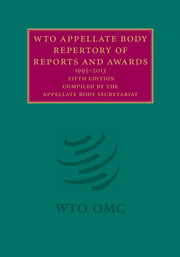Book contents
- Frontmatter
- Contents (outline)
- Contents
- Foreword to the 1995–2013 edition
- List of Abbreviations for Parts I and II
- Part I Appellate Body Reports
- A
- B
- C
- D
- E
- F
- G
- H
- I
- J
- L
- M
- N
- O
- P
- Q
- R
- S
- T
- V
- W
- PART II Arbitration Awards under Article 21.3(c) of the DSU
- Annexes
- Abbreviations used in the Table of References to the Covered Agreements and Other Instruments and in the Indexes
- Table of References to the Covered Agreements and Other Instruments by Article
- Subject Index
- Subject Index by Case (Appellate Body Reports)
- Subject Index by Case (Arbitration Awards under Article 21.3(c) of the DSU)
C
from Part I - Appellate Body Reports
Published online by Cambridge University Press: 05 March 2015
- Frontmatter
- Contents (outline)
- Contents
- Foreword to the 1995–2013 edition
- List of Abbreviations for Parts I and II
- Part I Appellate Body Reports
- A
- B
- C
- D
- E
- F
- G
- H
- I
- J
- L
- M
- N
- O
- P
- Q
- R
- S
- T
- V
- W
- PART II Arbitration Awards under Article 21.3(c) of the DSU
- Annexes
- Abbreviations used in the Table of References to the Covered Agreements and Other Instruments and in the Indexes
- Table of References to the Covered Agreements and Other Instruments by Article
- Subject Index
- Subject Index by Case (Appellate Body Reports)
- Subject Index by Case (Arbitration Awards under Article 21.3(c) of the DSU)
Summary
Claims and Arguments. See also Burden of Proof, General (B.3.1); Panel Reports, Basic rationale behind findings and conclusions (P.1.1); Request for the Establishment of a Panel (R.2); Terms of Reference of Panels (T.6); Working Procedures for Appellate Review, Rule 20 – Notice of Appeal (W.2.7)
C.1.1 Brazil–Desiccated Coconut, p. 22, DSR 1997:I, p. 167 at 186
(WT/DS22/AB/R)
… the “matter” referred to a panel for consideration consists of the specific claims stated by the parties to the dispute in the relevant documents specified in the terms of reference. We agree with the approach taken in previous adopted panel reports that a matter, which includes the claims composing that matter, does not fall within a panel's terms of reference unless the claims are identified in the documents referred to or contained in the terms of reference.
C.1.2 EC – Bananas III, para. 141
(WT/DS27/AB/R)
… In our view, there is a significant difference between the claims identified in the request for the establishment of a panel, which establish the panel's terms of reference under Article 7 of the DSU, and the arguments supporting those claims, which are set out and progressively clarified in the first written submissions, the rebuttal submissions and the first and second panel meetings with the parties.
C.1.3 EC – Bananas III, para. 143
(WT/DS27/AB/R)
… Article 6.2 of the DSU requires that the claims, but not the arguments, must all be specified sufficiently in the request for the establishment of a panel in order to allow the defending party and any third parties to know the legal basis of the complaint. If a claim is not specified in the request for the establishment of a panel, then a faulty request cannot be subsequently “cured” by a complaining party's argumentation in its first written submission to the panel or in any other submission or statement made later in the panel proceeding.
- Type
- Chapter
- Information
- WTO Appellate Body Repertory of Reports and Awards1995–2013, pp. 368 - 420Publisher: Cambridge University PressPrint publication year: 2014



